Whether it’s constructing a high-rise commercial complex or renovating your residential property, selecting the right civil engineering contractor is paramount. After all, you’re trusting them with the structural integrity, functionality, aesthetics, and safety of your project.
Post your Requirement
But with dozens of general contractors and sub-contractors to pick from, how do you make the best choice? Which aspects deserve the deepest evaluation? Well, fret no more! Here we bring the decision down to the 5 most vital factors for review to ensure you pick ideal civil contractors for any building project.
Experience and Expertise
As with any skill, experience breeds excellence in construction too. The breadth and depth of a contractor’s expertise make all the difference when handling multifaceted, large-scale civil projects. Some key markers of proficiency include:
- Years in Business: Contractors active for long periods consistently demonstrate sound technical know-how, project management, and adaptable resource mobilization across changing market conditions. Longevity indicates reliability.
- Past Project Success: Check not only the overall number but specifically the types and sizes of projects delivered successfully in the past matching your needs. Complex infrastructure and commercial builds need different specializations over modest residential remodels.
- Industry Recognition: Awards, certifications, and affiliations to trade bodies validate technical competence, quality compliance and service standards against industry benchmarks through rigorous evaluation.
- Methods and Technology: Contractors conversant with state-of-the-art construction techniques, materials and technologies like prefab components, BIM modeling or drone site surveys lead in innovatively executing even challenging builds efficiently.
By scrutinizing these aspects, you can determine if a contractor truly possesses the prerequisite expertise to handle your specific project requirements with exemplary results.
Legal Compliance
Any building activity must adhere to a complex array of legal norms for structural design feasibility, occupant safety, environmental impact, project finance and labor welfare. Only contractors well-versed in compliance deliver legally tenable, ethical projects. Areas to examine include:
- Permits and Approvals: Do they diligently obtain all architectural, utility and environment clearances mandatory for the project? What’s their track record with plan-sanctioning authorities?
- Insurance and Bonding: Financially stable bonding and comprehensive worker insurance coverage are a must to assure project completion and damage control.
- Labor Law Conformity: Building projects entail significant manual work so fair wage disbursal, workplace safety, and congregate worker welfare as regulated must stay a top priority.
- Code Conformance: Be it zoning laws, material standards, architectural accessibility or seismic stability; technical building codes must be stringently incorporated into planning.
While mundane and dense, legal aspects deeply impact construction projects throughout their lifecycle. How adeptly contractors incorporate them merits serious attention.
Quality and Workmanship
Extreme weather, daily wear-and-tear and constantly evolving usage impose immense demands on buildings over decades. Only robust construction quality and workmanship stand the test of time under such duress. Some revealing metrics here include:
- Component Quality: Building materials and bought-out components dictate intrinsic build quality, so verify the brands and grades being deployed. Using certified vendors and quality materials prevents issues down the road.
- Work Progress Oversight: Continuous monitoring, stringent inspection policies, and transparent reporting indicate systematic adherence to quality benchmarks by the contractor.
- Post-project Issues: Talk to previous customers about problems encountered over the years and the contractor’s response. Limited defects and quick issue resolution highlight capable work.
- Awards and Certification: Industry-recognized quality certifications like ISO 9001 require stringent quality audits and processes providing independent proof of consistent work standards.
Don’t compromise on construction quality just to save money early on. Evaluating it across planning, material selection and actual site execution prevents grave troubles later.
Responsiveness and Communication
Large construction initiatives easily take 6 months to 5 years from start to finish. Over such lengthy timeframes, seamless 2-way coordination between customer and contractor via:
- Progress briefings.
- Invitation to inspections.
- Review sign-offs.
- Payment approvals.
- Issue escalation.
Some indicators of responsive communication include:
- Interaction Mode: Notice if the contractor prefers emails, calls, or meetings for updates and whether periodic status reports get issued.
- Query and Complaint Response Time: Rapid responses to information requests and remedial action on quality issues reveal their commitment to customers.
- Staff Accessibility: Having multiple identified site supervisors and manager contacts across functions ensures someone takes ownership of resolving pressing customer concerns.
- Terms of Engagement: Explicit agreement on schedule of communication, designated contacts, and modes of interaction before project kickoff prevents future confusion.
How effortlessly contractors engage customers plays a major role in ensuring projects proceed smoothly even with modifications mid-way.
Pricing and Payments
Project investments often run into crores so both upfront pricing and payment plans merit rigorous evaluation before awarding contracts:
- Pricing Breakup: Insist on micro-level breakups across hundreds of work items rather than a macro lump sum figure lacking transparency. Granularity establishes pricing reasonability.
- Payment Terms: Structuring installments commensurate to quantifiable construction milestones permits smoother cash flows for customers than demanding huge sums upfront.
- Change Order Flexibility: Since modifications are common mid-project, how amenable are contractors to pricing changes, additions, or extra items reasonably beyond the contracted pricing?
- Price Escalation Shielding: With projects running for years, protection clauses against drastic hikes in material and labor costs ensure financial risks get handled predictably by contractors.
Investments in construction initiatives must certainly yield the desired outcomes within defined timespans. Hence scrutinizing contractual pricing and payment norms to optimize value forms a key selection criterion for contractors.
Conclusion
By evaluating contractors across these 5 aspects encompassing competencies, legalities, quality, responsiveness, and investments, homeowners and project promoters make genuinely informed decisions. Purposeful analysis outweighs getting swayed by flashy advertising claims. After all, the constructed civil assets are invaluable infrastructure supporting hundreds of inhabitants daily across decades.
These structures form the foundation upholding people’s spirits while enabling diverse community activities. Choosing construction partners wisely is thus an onerous obligation for promoters and civic authorities alike towards citizens who place immense trust in builders molding the spaces they occupy. With enhanced discernment of crucial choice drivers, may you succeed in identifying and collaborating with accomplished civil contractors to deliver lasting projects that transform societies for the better.























Post A Comment